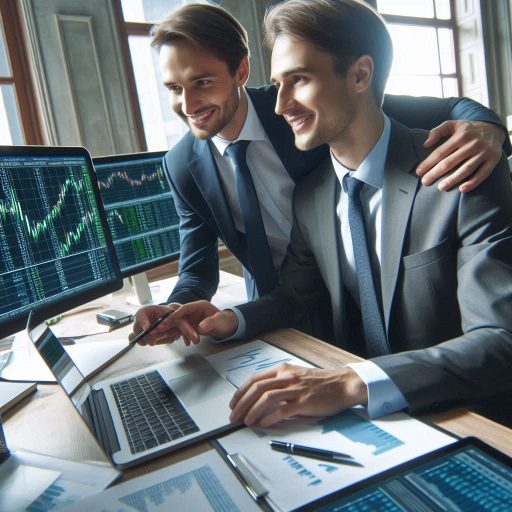Introduction
Securities trading involves the buying and selling of financial instruments such as stocks, bonds, and derivatives, essential for capital markets and economic growth.
Historically, trading relied on manual processes executed on physical exchanges, where brokers facilitated transactions through face-to-face interactions.
This traditional approach, though effective, was time-consuming and prone to human error.
Moreover, technology has introduced sophisticated algorithms and automated trading systems that analyze vast datasets to identify trading opportunities.
Automation minimizes human error and enables high-frequency trading. This process executes large volumes of trades in fractions of a second.
The integration of artificial intelligence (AI) and machine learning further enhances trading strategies.
Providing deeper insights and more accurate predictions based on complex data analysis.
As technology continues to evolve, its role in securities trading becomes increasingly pivotal.
The future of trading is likely to be shaped by ongoing innovations, including blockchain technology, which promises to enhance transparency and security.
Understanding these technological advancements is crucial for grasping how they will influence trading practices and the broader financial industry.
Historical perspective
Historical Perspective on Securities Trading
Securities trading has undergone significant evolution. From its origins to today’s high-tech markets, technology has played a pivotal role.
Let’s explore this evolution, focusing on technology’s impact.
Early Stages of Trading
In the early days, trading was a manual process. Brokers met face-to-face to buy and sell stocks.
Information flowed slowly, with news reaching traders via newspapers and word of mouth.
Orders were executed based on handwritten instructions, leading to delays and inefficiencies.
The Role of Technology in Early Trading
The introduction of technology marked a turning point in trading practices.
- Telegraph (1850s): Enabled faster communication of market information, reducing the time for news to reach traders.
- Telephone (1870s): Allowed brokers to place orders more quickly and efficiently, improving transaction speeds.
- Ticker Tape Machines (1920s): Automated the transmission of stock prices, making real-time data available to traders.
These advancements began to reshape the trading landscape. Technology started to reduce human error and speed up trading processes.
Major Technological Advancements
As technology continued to develop, several key advancements transformed securities trading.
- Electronic Trading Systems (1970s): Automated order entry and execution, increasing efficiency and reducing manual errors.
- Online Trading Platforms (1990s): Allowed individual investors to trade from home, democratizing access to markets and increasing market participation.
- Algorithmic Trading (2000s): Enabled traders to use algorithms for executing orders at optimal times and prices, revolutionizing trading strategies.
- High-Frequency Trading (2010s): Leveraged advanced algorithms and high-speed data connections to execute thousands of trades in milliseconds.
These technological advancements have drastically changed how securities trading operates.
They have made trading faster, more accurate, and more accessible.
From manual processes to sophisticated algorithms, technology has profoundly impacted securities trading.
Each technological leap has brought increased efficiency and new opportunities for traders.
As technology continues to advance, the securities trading industry will keep evolving, further transforming how trades are executed and markets are accessed.
Read: How Investment Bankers Help Companies Go Public
Automation and Efficiency in Securities Trading
Technology has revolutionized securities trading through automation and enhanced efficiency.
This transformation has streamlined processes and introduced new technologies.
Here‘s a closer look at how automation has reshaped the trading landscape.
Automation of Trading Processes
Automation has fundamentally changed how trading operates. Before, traders manually executed orders and monitored markets.
Today, sophisticated algorithms handle these tasks. Automated trading systems can:
- Execute trades based on predefined criteria
- Monitor multiple markets simultaneously
- Adjust strategies in real-time
These systems minimize human error and speed up decision-making.
Traders rely on these technologies to maintain accuracy and efficiency.
Increased Speed and Efficiency
The introduction of automation has significantly increased trading speed.
Automated systems process orders in milliseconds, far surpassing manual capabilities.
This rapid execution reduces latency and allows for more transactions in a shorter time. Efficiency has soared as a result. For instance:
- High-frequency trading (HFT) uses algorithms to place large volumes of trades quickly
- Algorithmic trading systems adjust trading strategies based on market conditions in real-time
- Electronic communication networks (ECNs) facilitate faster order matching and execution
These advancements enable traders to react to market changes almost instantly.
The result is a more dynamic and responsive trading environment.
Examples of Revolutionary Technologies
Several technologies have revolutionized securities trading through automation. Here are a few notable examples:
- Algorithmic Trading: Uses algorithms to automatically execute trades based on set parameters.
It enhances speed and reduces the impact of human emotions on trading decisions. - High-Frequency Trading (HFT): Employs complex algorithms to execute trades at extremely high speeds.
HFT strategies capitalize on small price movements over short timeframes. - Machine Learning: Enhances trading strategies by analyzing vast amounts of data. It identifies patterns and predicts market trends more accurately.
- Blockchain Technology: Improves transparency and security in trading. Blockchain ensures that transactions are immutable and verifiable, reducing the risk of fraud.
- Artificial Intelligence (AI): Assists in predicting market movements and optimizing trading strategies.
AI systems adapt to new information and refine their predictions.
Technology has transformed securities trading by automating processes and increasing efficiency.
Automation speeds up trades and reduces errors, while new technologies like AI and blockchain offer advanced solutions for trading challenges.
As technology continues to evolve, its impact on securities trading will likely deepen, making it even more efficient and effective.
Read: Investment Banker vs. Financial Analyst: Key Differences
Access to global markets
Technology has enabled traders to easily access international securities markets.
Technology has greatly facilitated access to global markets for securities trading.
In the past, trading on international markets was a complex and challenging task that required significant resources and expertise.
However, with the advancements in technology, traders can now easily access a wide range of international securities markets with just a few clicks of a button.
Advanced trading platforms have revolutionized global trading by providing real-time data.
Advanced trading platforms play a crucial role in this process.
These platforms provide traders with real-time data, advanced analytical tools, and seamless connectivity to global markets.
Traders can execute trades quickly and efficiently, keeping up with the fast-paced nature of global trading.
This has significantly improved the efficiency and accuracy of trading on international markets.
Individual traders can now participate in global markets due to technology.
Moreover, technology has broken down barriers to entry for individual traders.
In the past, trading on global markets was mainly dominated by institutional investors and large financial institutions.
However, with the advent of online trading platforms and mobile trading apps, individual traders can now participate in global markets with ease.
Individual traders can open trading accounts, access market information, execute trades, and manage their portfolios from anywhere in the world.
This level of accessibility was previously unimaginable and has democratized the world of securities trading.
Technology has leveled the playing field, allowing individual traders to compete with institutional investors on a global scale.
Transform Your Career Today
Unlock a personalized career strategy that drives real results. Get tailored advice and a roadmap designed just for you.
Start NowRead: Pros and Cons of Working in Investment Banking
Algorithmic trading
Algorithmic trading refers to the use of computer algorithms to execute trading strategies in the financial markets.
It has revolutionized securities trading by automating the process of buying and selling assets.
Significance of algorithmic trading
- Ensures quick and efficient trade execution
- Reduces human errors in trading
- Allows for backtesting and optimization of strategies
- Provides liquidity to the market
- Enables high-frequency trading
Advantages of algorithmic trading
- Speed: Algorithms can execute trades in milliseconds, responding to market changes instantly.
- Accuracy: Eliminates emotional decision-making, leading to more objective and consistent results.
- Cost-effective: Reduces trading costs by minimizing slippage and human labor expenses.
- Diversification: Enables traders to implement multiple strategies simultaneously across different assets.
- Risk management: Algorithms can incorporate risk controls to mitigate potential losses.
Drawbacks of algorithmic trading
- Technical failures: Any glitches in the algorithm can lead to large financial losses.
- Over-reliance on technology: Traders may lose the human touch and intuition in decision-making.
- Market impact: High-frequency trading algorithms can cause market volatility and flash crashes.
- Regulatory challenges: Regulators may struggle to keep up with the rapid pace of algorithmic trading.
- Complexity: Developing and maintaining sophisticated algorithms require specialized knowledge and resources.
Impact of technology on trading strategies through algorithms:
Advancements in technology have greatly enhanced trading strategies through the use of algorithms.
Here are some ways in which technology has improved trading strategies.
- Increased speed and efficiency: Algorithms process vast amounts of data quickly. This technology lets traders seize market opportunities in real-time.
- Enhanced automation: Algorithms automate the trading process, freeing up traders to focus on strategy development and risk management.
- Improved risk management: Technology enables algorithms to incorporate risk controls and stop-loss mechanisms to protect against potential losses.
- Optimized execution: Algorithms can split large orders into smaller ones, minimizing market impact and achieving better execution prices.
- Backtesting capabilities: Technology allows traders to backtest their strategies using historical data to assess performance and refine their algorithms.
Algorithmic trading has become an integral part of securities trading, thanks to advancements in technology.
While it offers numerous benefits, traders need to be aware of the drawbacks and risks associated with algorithmic trading to effectively leverage its advantages.
Technology will continue to shape the future of securities trading, providing new opportunities for traders to enhance their strategies through algorithms.
Read: Essential Qualifications for Aspiring Investment Bankers

Big data and analytics: Big Data and Analytics in Securities Trading
Revolutionizing Securities Trading
Big data and analytics have fundamentally changed securities trading.
Traders now leverage vast amounts of data to make informed decisions.
This data includes market trends, economic indicators, and social media sentiment.
By analyzing large datasets, traders gain insights that were previously unattainable.
As a result, they can anticipate market movements more accurately.
Role of Artificial Intelligence and Machine Learning
Artificial intelligence (AI) and machine learning (ML) play a critical role in modern trading strategies. Here‘s how:
- Predictive Analytics: AI models analyze historical data to predict future price movements.
- Algorithmic Trading: ML algorithms execute trades at optimal times, based on real-time data.
- Risk Management: AI tools assess and mitigate potential risks by evaluating market conditions and trading patterns.
These technologies enhance the speed and accuracy of trading decisions.
They process data faster than human traders and identify patterns that might be missed manually.
Importance of Data Analysis in Investment Strategies
Data analysis is crucial for shaping effective investment strategies. Here‘s why:
- Informed Decisions: Investors use data to understand market trends and identify profitable opportunities.
- Performance Evaluation: Data analysis helps evaluate the success of past trades and strategies.
- Strategic Adjustments: Continuous data monitoring allows traders to adjust strategies in response to market changes.
In essence, big data and analytics provide a competitive edge in the trading world.
By integrating AI and ML, traders can enhance their decision-making processes and refine their strategies.
Data-driven insights lead to more accurate predictions and better risk management.
As technology continues to evolve, its role in securities trading will only grow more significant.
Learn More: Importance of Financial Modeling for Venture Capital Analysts
Cybersecurity Implications in Securities Trading
As technology advances, cybersecurity in securities trading becomes increasingly critical.
Financial institutions face growing concerns about protecting sensitive data and ensuring safe transactions.
Here‘s an overview of the cybersecurity implications and the measures taken to secure trading platforms.
Growing Concerns Around Cybersecurity
The rise of digital trading platforms has amplified cybersecurity risks.
Hackers now target trading systems to steal valuable financial data.
The complexity of trading algorithms and real-time data access increases vulnerability.
Recent high-profile breaches demonstrate the need for robust security measures.
Investors and institutions must stay vigilant against cyber threats.
Measures to Secure Trading Platforms
To safeguard trading platforms, institutions employ several strategies:
- Advanced Encryption: Protects data in transit and at rest, ensuring secure communication channels.
- Multi-Factor Authentication (MFA): Enhances access control by requiring multiple forms of verification.
- Regular Software Updates: Patches vulnerabilities and prevents exploitation of outdated systems.
- Network Security Protocols: Includes firewalls, intrusion detection systems, and secure connections to thwart unauthorized access.
- Data Backup Solutions: Ensures data recovery in case of a breach or system failure.
- Compliance with Regulations: Adheres to industry standards and legal requirements for data protection.
Technology’s Role in Detecting and Preventing Breaches
Technology plays a crucial role in enhancing cybersecurity measures. Here‘s how:
- Real-Time Monitoring: Automated systems detect suspicious activities as they happen, enabling swift response.
- Artificial Intelligence (AI): AI algorithms analyze patterns to identify potential threats and anomalies.
- Machine Learning: Machine learning models adapt to new threats by learning from past incidents.
- Behavioral Analytics: Monitors user behavior to flag unusual activities that may indicate a breach.
- Threat Intelligence: Provides insights into emerging threats and helps in proactive defense measures.
- Blockchain Technology: Offers a decentralized approach to secure transactions, making it harder for hackers to alter data.
By integrating these technologies, trading platforms improve their ability to prevent and respond to security breaches.
Ensuring robust cybersecurity is essential for maintaining trust and integrity in the financial markets.
Addressing cybersecurity concerns in securities trading involves a combination of advanced technology and stringent measures.
As digital trading continues to evolve, staying ahead of cyber threats remains a top priority for financial institutions and investors alike.
Discover More: How to Optimize Your Tax Strategy Year-Round
Impact of Technology on Traditional Trading Models
Technology has transformed the securities trading industry, disrupting traditional models and reshaping how trades are executed.
As online platforms and mobile apps gain dominance, the landscape of trading continues to evolve.
Below, we explore the key changes driven by technology and the future of securities trading.
Disruption of Traditional Trading Models
Historically, securities trading relied on manual processes and direct human interaction.
Traders would physically meet at stock exchanges or use telephones to place trades.
However, the advent of technology has completely altered these traditional methods.
Transform Your Career Today
Unlock a personalized career strategy that drives real results. Get tailored advice and a roadmap designed just for you.
Start Now- Automation: Trading algorithms now replace human decision-making, executing trades in milliseconds.
- Faster Execution: Technology reduces delays, enabling immediate execution of orders and increased market liquidity.
- Lower Costs: With digital systems, trading fees and commissions have decreased significantly, benefiting both retail and institutional investors.
- Increased Access: Retail investors now have direct access to markets without needing brokers or middlemen.
These changes have made traditional trading models less efficient compared to their digital counterparts.
The emphasis on speed, efficiency, and lower costs has driven widespread adoption of new technologies.
The Shift Towards Online Trading Platforms and Mobile Apps
Online trading platforms and mobile apps have revolutionized the way people trade securities.
Investors no longer need to rely on stockbrokers to execute trades.
With the tap of a screen, anyone can buy or sell stocks instantly.
- Convenience: Mobile apps allow users to trade from anywhere, at any time, eliminating the need for physical presence.
- Real-Time Information: Online platforms provide live data, charts, and analysis, giving traders more information to make informed decisions.
- Democratization of Trading: Low or no-cost trading apps have opened up markets to a broader audience, including younger, tech-savvy investors.
- Customizable Alerts: These platforms offer personalized notifications, alerting traders to price changes or market news in real-time.
As a result, online and mobile trading platforms are rapidly replacing traditional methods, making trading more accessible and engaging.
The Future of Securities Trading in the Digital Age
The future of securities trading lies in continued digital innovation. As technology evolves, we can expect further disruption of existing models.
- Artificial Intelligence (AI): AI will continue to enhance predictive analytics and automate trading decisions.
- Blockchain Technology: Blockchain may secure transactions and eliminate intermediaries, leading to faster and more transparent trades.
- Decentralized Finance (DeFi): The rise of DeFi platforms will create new avenues for peer-to-peer trading without the need for centralized exchanges.
- Virtual Reality (VR): VR could offer immersive trading environments, enhancing the user experience for investors.
Technology has fundamentally changed how securities trading operates.
The move towards digital platforms and automation continues to reshape the industry, pointing toward an even more connected and efficient future.
Conclusion
Technology has profoundly transformed securities trading, reshaping the landscape of financial markets.
Algorithms and artificial intelligence (AI) have revolutionized trading strategies, enabling faster and more accurate decision-making.
Automation has minimized human error, optimized processes, and increased market liquidity, making trading operations more efficient.
This shift towards technology-driven trading is not merely a trend but a significant evolution that shapes the future of the industry.
As technology continues to advance, its influence on trading practices and market dynamics will only grow.
Embracing technological advancements is crucial for traders and financial professionals aiming to stay competitive.
Integrating tech skills into trading careers has become essential for success in this data-driven environment.
The future of securities trading is tightly intertwined with ongoing technological innovations.
Professionals must remain proactive in exploring and adapting to these changes to unlock new opportunities and enhance their roles within the financial sector.
The continuous evolution of technology promises to drive further advancements in trading practices.
Making it vital for individuals and organizations to stay informed and agile in this rapidly changing field.




